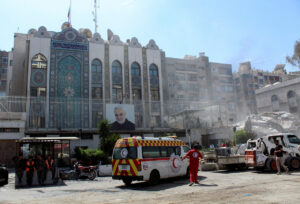The Israeli government has shuttered 28 diplomatic missions worldwide. The closures come in response to mounting fears of retaliation by Iran following recent military actions in Syria.

According to reports from The Jerusalem Post and Yedioth Ahronoth, Israeli authorities evacuated embassies and consulates in key locations including Bahrain, Egypt, Jordan, Morocco, and Turkey, citing specific threats from Iran. These closures are seen as a precautionary measure after Israel targeted the Iranian consulate in Syria.
The recent missile assault on the Iranian Consulate in Damascus led to casualties, including senior Iranian military officials. The Islamic Revolution Guards Corps (IRGC) confirmed the deaths of Generals Mohammad Reza Zahedi and Mohammad Hadi Haj Rahimi, along with five others. Iran swiftly condemned the attack, vowing to seek justice through diplomatic channels, including a request for an emergency session of the UN Security Council.
Iranian Ambassador to Damascus, Hossein Akbari, condemned the Israeli strikes and called for international intervention to prevent further aggression. Akbari’s statements underscored Iran’s determination to hold Israel accountable for its actions.
The Israeli government’s decision to close diplomatic missions and stockpile essential supplies indicates heightened concerns about potential retaliation from Iran. Despite these measures, Iranian intentions remain ambiguous, leaving Israeli officials on edge.
In response to the escalating tensions, Iranian Supreme Leader Ayatollah Seyyed Ali Khamenei vowed retribution, promising that Iran’s “brave men” will make Israel “regret” its actions. Khamenei’s remarks signal Iran’s unwavering commitment to defending its interests against what it perceives as Israeli aggression.
Also Read: Israel’s Travel Advisory and the Enigma of the Embassy Blast in New Delhi
The bombing of the Iranian consulate in Damascus represents a dangerous escalation in the long-standing conflict between Israel and Iran. As diplomatic tensions reach a boiling point, the international community faces the urgent task of preventing further violence and facilitating dialogue to de-escalate the situation.
In conclusion, Israel’s closure of diplomatic missions underscores the precarious nature of its relationship with Iran. The recent hostilities serve as a stark reminder of the volatile dynamics shaping the Middle East and the urgent need for diplomatic solutions to avoid further bloodshed.